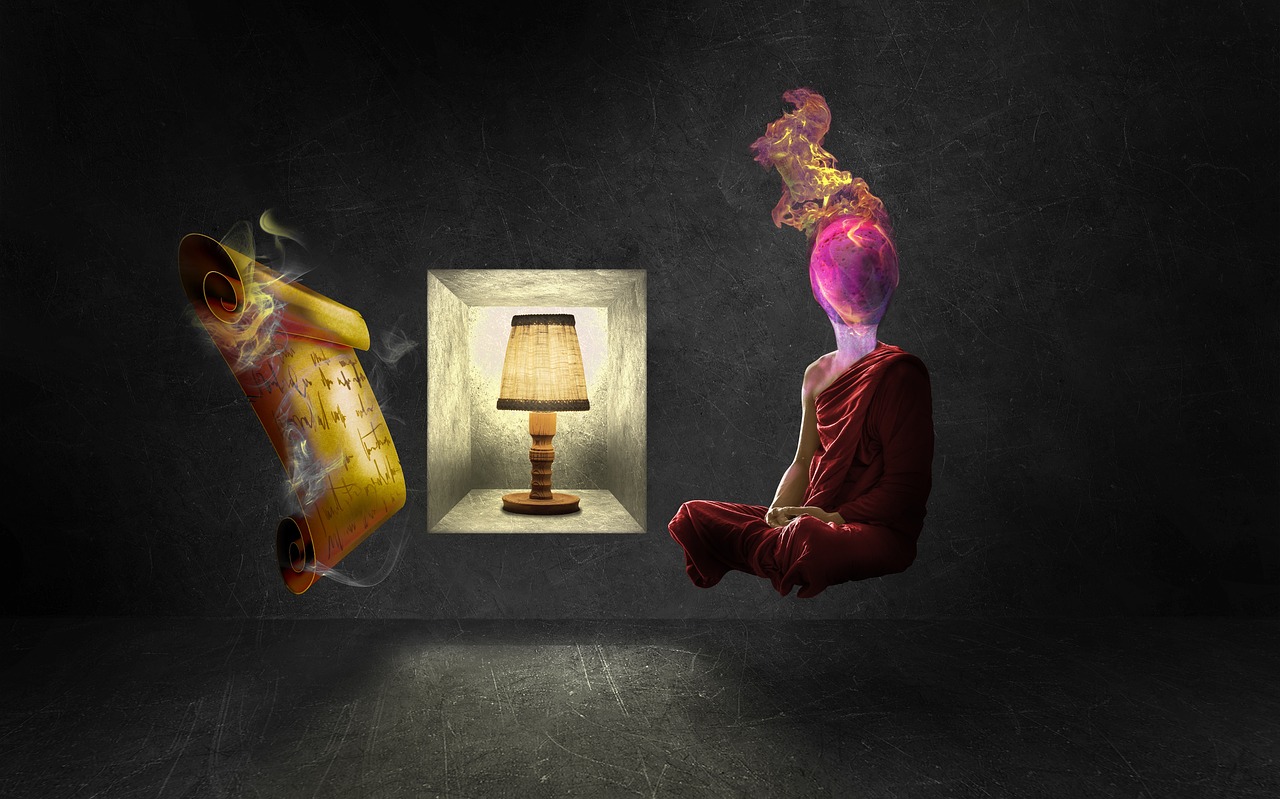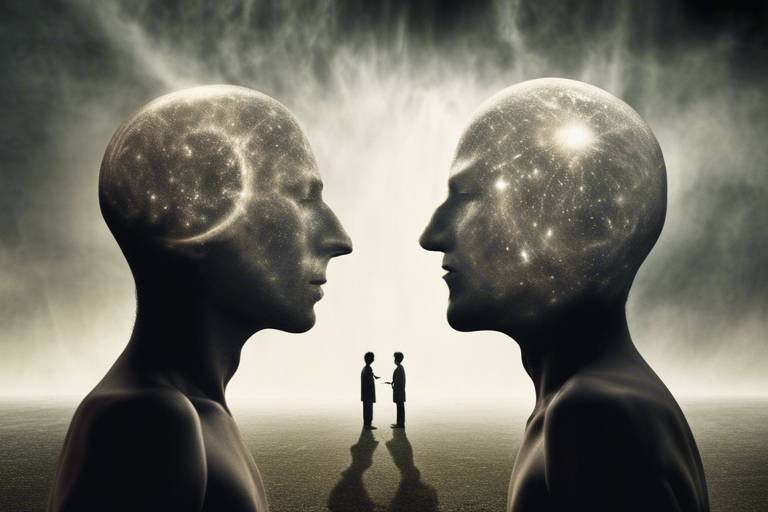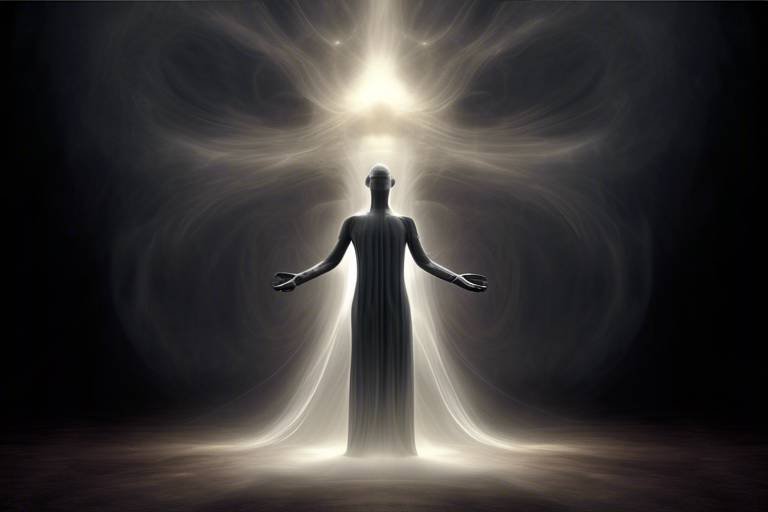Metaphysics - An Investigation into a Future Life
Metaphysics, the branch of philosophy that delves into the nature of reality and existence, poses some of the most profound questions humanity has ever faced. What does it mean to exist? Are we merely biological machines, or is there something more to our being? These inquiries are not just academic; they touch upon our deepest fears and hopes, particularly concerning the idea of a future life. This article aims to explore these philosophical concepts surrounding metaphysics, particularly focusing on the nature of existence, consciousness, and the implications of a potential life beyond our current understanding.
To examine the nature of existence is to embark on a journey that challenges our very understanding of reality. Philosophers have long debated what it means to exist. Some argue that existence is a fundamental aspect of the universe, while others suggest that it is a construct of human perception. For instance, the ancient Greek philosopher Parmenides believed that change is an illusion and that true existence is unchanging and eternal. In contrast, Heraclitus famously stated that "everything flows," emphasizing the transient nature of reality. These contrasting views lead us to question: if existence is fluid, what does that imply for our understanding of life itself? Are we simply observers in a grand cosmic play, or do we have a role in shaping our own reality?
The relationship between consciousness and personal identity is another critical area of metaphysical inquiry. How does our awareness shape our understanding of self? When we think about who we are, we often refer to our memories, experiences, and thoughts. This leads to a fascinating question: if our consciousness is altered or ceases to exist, do we still remain the same person? This conundrum is central to discussions about life after death. If consciousness continues in some form, what does that mean for our identity? Does the essence of who we are persist beyond our physical bodies, or are we merely a collection of memories and experiences that fade with time?
Several philosophical theories attempt to explain consciousness and its implications for metaphysical discussions about life beyond the physical realm. These include:
- Dualism: The belief that the mind and body are distinct entities, suggesting that consciousness may exist independently of the physical body.
- Physicalism: The view that everything about the mind can be explained by physical processes, implying that consciousness ceases to exist when the body dies.
- Panpsychism: The idea that consciousness is a fundamental aspect of all matter, proposing that everything has some degree of awareness.
Each of these theories offers unique insights, shaping our understanding of existence and the possibility of an afterlife.
When comparing dualistic and physicalist perspectives, we find a rich tapestry of implications for the concept of an afterlife. Dualism, championed by philosophers like Descartes, posits that the mind is separate from the body, allowing for the possibility of existence beyond physical death. On the other hand, physicalism argues that consciousness is tied to the brain’s functioning; thus, when the body dies, so does consciousness. This dichotomy raises profound questions: If dualism is true, what does the afterlife look like? Conversely, if physicalism holds, how do we find meaning in our lives, knowing that our existence may be finite?
Subjective experience plays a crucial role in understanding consciousness. Our personal experiences shape our beliefs about existence and the possibility of life after death. For instance, many people recount near-death experiences that challenge the notion of a purely physical existence. These accounts often describe feelings of peace, encounters with deceased loved ones, or even life reviews. Such experiences can profoundly influence one’s beliefs about what happens after we die, leading to a more nuanced understanding of existence itself.
The philosophical problem of personal identity over time is another fascinating area of inquiry. What does it mean to remain the same person throughout life? Consider this: if every cell in your body is replaced over time, are you still the same person you were in your childhood? This question complicates our understanding of the afterlife. If our identity is fluid, how do we account for the continuity of self in a potential future life? This inquiry not only challenges our metaphysical beliefs but also influences how we live our lives today.
Various metaphysical perspectives on the afterlife exist, including religious, spiritual, and secular viewpoints. These beliefs significantly influence human behavior and ethics. For example, many religions offer visions of heaven, hell, or reincarnation, providing followers with frameworks for understanding their existence and moral responsibilities. In contrast, secular viewpoints often question the very existence of an afterlife, leading to a focus on making the most of our current lives. This diversity of thought prompts us to reflect on our beliefs about life after death and how they shape our actions.
Religious beliefs about the afterlife vary widely, encompassing concepts such as:
- Heaven: A state of eternal bliss and union with the divine.
- Hell: An existence of suffering and separation from the divine.
- Reincarnation: The belief in rebirth into a new body, continuing the cycle of life and death.
These interpretations not only provide comfort but also challenge individuals to consider the purpose of their lives and the moral implications of their actions.
On the other hand, secular perspectives often adopt a more skeptical view of life after death. Philosophers like Epicurus argued that fear of death is irrational, as we do not experience anything after our physical existence ends. This viewpoint raises essential questions about morality and the meaning of life. If there is no afterlife, how should we approach our ethical decisions and relationships with others? Understanding these secular arguments can lead to a more profound appreciation of the here and now, encouraging us to live with intention and purpose.
The relationship between ethics and metaphysical beliefs is a complex tapestry. Our understanding of existence and the afterlife significantly influences our moral behavior and decision-making. If one believes in a judgment after death, they may feel compelled to act ethically, fearing repercussions in a future life. Conversely, those who adopt a secular viewpoint may focus on the consequences of their actions in this life, shaping their moral compass based on empathy and societal norms. This interplay between metaphysics and ethics invites us to reflect on our beliefs and how they guide our actions in the world.
- What is metaphysics?
Metaphysics is a branch of philosophy that explores the fundamental nature of reality, existence, and the relationship between mind and matter. - What are the main theories of consciousness?
The main theories include dualism, physicalism, and panpsychism, each providing different perspectives on the nature of consciousness. - Do all religions believe in an afterlife?
No, beliefs about the afterlife vary widely among different religions, with some offering concepts of heaven and hell, while others believe in reincarnation or do not support an afterlife at all. - How do metaphysical beliefs influence ethics?
Beliefs about existence and the afterlife can shape moral behavior, as individuals may feel accountable to a higher power or focus on the consequences of their actions in this life.

The Nature of Existence
When we ponder the question of existence, we often find ourselves at a crossroads of philosophy, science, and spirituality. What does it truly mean to exist? Is it merely to occupy space and time, or is there something deeper at play? This inquiry into the nature of existence is not just an academic exercise; it’s a fundamental aspect of the human experience that shapes our understanding of life and our place within it.
Philosophers throughout history have grappled with these profound questions. From the ancient Greeks to modern thinkers, the exploration of existence has been at the forefront of metaphysical inquiry. For instance, Plato posited that the physical world is merely a shadow of a higher reality, suggesting that true existence lies beyond what we can see and touch. In contrast, Aristotle took a more empirical approach, emphasizing the importance of the material world and our direct experiences within it.
As we delve deeper into this philosophical landscape, we encounter various perspectives that challenge our conventional understanding of reality. Some argue that existence is a product of consciousness itself, a view famously championed by Immanuel Kant, who contended that our perceptions shape our reality. This leads us to consider the implications of consciousness not just as a byproduct of our existence, but as a defining feature that gives life meaning.
Moreover, the nature of existence raises questions about the relationship between the mind and the body. Are we simply biological machines, or is there an essence that transcends our physical form? This inquiry is at the heart of the dualism versus physicalism debate, where dualists argue for the separation of mind and body, while physicalists assert that everything about our existence can be explained through physical processes.
To further illustrate these concepts, let’s examine the following table that summarizes key philosophical perspectives on existence:
| Philosopher | Viewpoint | Implications for Existence |
|---|---|---|
| Plato | Idealism | True existence is beyond the physical realm. |
| Aristotle | Empiricism | Existence is rooted in the material world. |
| Kant | Transcendental Idealism | Our perceptions shape our understanding of existence. |
| Descartes | Dualism | Mind and body are distinct entities. |
| Hume | Skepticism | Questioning the certainty of existence. |
As we navigate through these philosophical waters, we must also consider the implications of our beliefs about existence on our daily lives. How do our views shape our choices, our relationships, and our understanding of life's purpose? For many, grappling with the nature of existence can lead to a sense of existential dread, but it can also foster a profound appreciation for the fleeting moments of life.
In essence, the nature of existence is a tapestry woven from myriad threads of thought, experience, and belief. It invites us to question, to explore, and ultimately to seek our own understanding of what it means to be alive. In a world filled with uncertainty, the quest for meaning remains a constant, driving us to dig deeper into the very fabric of reality.

Consciousness and Identity
Have you ever paused to ponder what makes you, *you*? The intricate relationship between consciousness and personal identity is a captivating journey into the depths of our existence. It’s like trying to catch smoke with your bare hands—elusive and complex. Consciousness isn't just about being awake; it’s about the rich tapestry of thoughts, feelings, and experiences that shape our perception of self. This section dives deep into how our awareness not only defines who we are but also influences our beliefs about life beyond this world.
To understand this connection, we must first explore the concept of consciousness itself. Think of consciousness as the stage upon which the drama of our lives unfolds. Every thought, every emotion, and every memory plays a role in shaping our identity. But what happens when we start to question the permanence of this identity? Are we the same person we were five years ago? Or even last year? The philosophical debate surrounding personal identity over time is as intricate as a spider’s web, with various strands representing different theories and perspectives.
One popular theory is that of psychological continuity, which suggests that our identity is tied to our memories and experiences. Imagine your life as a book; each chapter represents a different period, but the narrative remains cohesive because of the characters and events that connect them. This continuity raises intriguing questions: If our memories fade or change, does that mean we cease to be the same person? Or consider the implications of a hypothetical scenario where our consciousness could be transferred to another body. Would we still retain our identity, or would we become someone entirely new?
Furthermore, the question of consciousness leads us to explore the mind-body relationship. Are our thoughts merely products of our brain's physical processes, or is there something more? This is where the philosophical theories of dualism and physicalism come into play. Dualism posits that the mind and body are distinct entities, while physicalism argues that everything about consciousness can be explained through physical processes in the brain. Each perspective offers unique insights into how we view ourselves and our potential existence after death.
Moreover, subjective experiences play a crucial role in shaping our understanding of consciousness. Each person's journey through life is marked by unique experiences that color their perception of reality. For instance, two people can witness the same event but interpret it differently based on their past experiences, beliefs, and emotions. This subjectivity not only influences our identity but also our beliefs about what lies beyond this life. When we think about an afterlife, our previous experiences and the way we perceive them will inevitably shape our expectations and hopes.
In summary, the relationship between consciousness and identity is a profound exploration of what it means to exist. As we navigate through life, our consciousness acts as both a mirror and a canvas, reflecting and shaping our identity in a continuous dance. This interplay raises essential questions about our existence and what may await us beyond the veil of death. With each philosophical inquiry, we inch closer to understanding not just who we are, but also the potential of who we might become.
- What is consciousness? Consciousness is the state of being aware of and able to think about one's own existence, thoughts, and surroundings.
- How does consciousness relate to identity? Consciousness shapes our identity by informing our thoughts, memories, and experiences, which together define who we are.
- Can our identity change over time? Yes, our identity can change as our experiences and memories evolve, leading to questions about the permanence of who we are.
- What are dualism and physicalism? Dualism is the belief that the mind and body are separate entities, while physicalism asserts that everything about consciousness can be explained through physical processes.
- How do subjective experiences influence beliefs about the afterlife? Subjective experiences shape our perceptions and expectations, influencing how we view the possibility of life after death.

Philosophical Theories of Consciousness
This article explores the philosophical concepts surrounding metaphysics, particularly focusing on the nature of existence, consciousness, and the implications of a potential future life beyond our current understanding.
Examining what it means to exist, this section delves into various philosophical perspectives on existence and reality, questioning the fundamental nature of being and its implications for understanding life itself.
This subheading explores the relationship between consciousness and personal identity, investigating how our awareness shapes our understanding of self and influences beliefs about life after death.
When we dive into the realm of consciousness, we encounter a fascinating tapestry woven from various philosophical theories that attempt to explain what consciousness is and how it relates to our existence. Imagine consciousness as a vast ocean, with each theory representing a different wave, crashing against the shores of our understanding. These theories not only help us grasp the essence of our awareness but also raise profound questions about the nature of reality itself.
One of the most prominent theories is dualism, which posits that the mind and body are distinct entities. Think of it like a two-part play: the mind is the actor, while the body is the stage. Dualists argue that our thoughts and feelings exist independently of our physical form, suggesting that consciousness can persist beyond death. This perspective opens up intriguing possibilities about the afterlife, as it implies that our essence could survive the demise of our physical bodies.
On the other hand, we have physicalism, which asserts that everything about consciousness can be explained through physical processes. In this view, our thoughts, emotions, and experiences are merely byproducts of brain activity. It's akin to a complex machine where every cog and wheel plays a crucial role in producing the final output. For physicalists, the idea of an afterlife becomes more complicated, as they argue that once the brain ceases to function, so does consciousness.
Then there's the intriguing theory of panpsychism, which suggests that consciousness is a fundamental aspect of all matter. Imagine every particle in the universe possessing a tiny spark of consciousness, contributing to a grand tapestry of awareness. This theory raises questions about the interconnectedness of all beings and the potential for consciousness to transcend individual existence. It challenges us to consider whether our personal experiences are merely a drop in an expansive ocean of collective awareness.
As we explore these theories, it becomes clear that the mind-body relationship is a crucial focal point. The table below summarizes the key differences between dualism and physicalism:
| Theory | View on Mind-Body Relationship | Implications for Afterlife |
|---|---|---|
| Dualism | Mind and body are separate entities | Consciousness may survive physical death |
| Physicalism | Mind is a product of physical processes | Consciousness ceases with brain activity |
In addition to these theories, the subjective experience plays a vital role in our understanding of consciousness. Each individual's perception of reality is shaped by their unique experiences, emotions, and thoughts. This personal lens through which we view the world colors our beliefs about existence and the possibility of life after death. For instance, someone who has experienced a profound moment of connection or transcendence may be more inclined to believe in an afterlife compared to someone who views life through a strictly empirical lens.
Ultimately, the exploration of consciousness is a journey filled with questions that may never be fully answered. However, the insights gained from these philosophical theories not only deepen our understanding of ourselves but also challenge us to reflect on the implications of our beliefs about existence, identity, and what lies beyond.
This section presents various metaphysical perspectives on the afterlife, including religious, spiritual, and secular viewpoints, analyzing how these beliefs influence human behavior and ethics.
An examination of different religious beliefs regarding the afterlife, including concepts of heaven, hell, and reincarnation, and their implications for understanding the purpose of life.
Exploring secular perspectives on life after death, this section discusses philosophical arguments that question the existence of an afterlife and the implications for human existence and morality.
Investigating the relationship between ethics and metaphysical beliefs, this section considers how our understanding of existence and the afterlife influences moral behavior and decision-making in everyday life.
- What is metaphysics? Metaphysics is a branch of philosophy that explores the fundamental nature of reality, including concepts such as existence, being, and the universe.
- What are the main theories of consciousness? The main theories include dualism, physicalism, and panpsychism, each offering different perspectives on the mind-body relationship.
- Do all philosophies agree on the afterlife? No, there are various perspectives on the afterlife, ranging from religious beliefs in heaven and hell to secular views that question its existence.

Dualism vs. Physicalism
When diving into the ocean of consciousness, two prominent philosophical perspectives emerge: dualism and physicalism. These theories offer contrasting views on the nature of the mind and its relationship to the body, which in turn shapes our understanding of existence and the potential for an afterlife. At its core, dualism posits that the mind and body are fundamentally different substances. Think of it like oil and water—two entities that do not easily mix. This perspective suggests that our consciousness exists independently of our physical form, opening the door to the idea of an afterlife where the mind could continue to exist beyond the death of the body.
On the other hand, physicalism argues that everything about the mind can be explained through physical processes. Imagine a computer: every thought, feeling, and experience is akin to a program running on hardware. According to physicalists, once the body ceases to function, so does consciousness. This perspective raises profound questions about what happens to our identity and experiences when we die. If consciousness is merely a byproduct of physical processes, does that mean our essence fades away with our last breath?
To better understand these two perspectives, let’s break down their key characteristics:
| Aspect | Dualism | Physicalism |
|---|---|---|
| Nature of Mind | Independent of the body | Dependent on physical processes |
| Afterlife | Possible existence beyond death | No existence after death |
| Identity | Maintained through the mind | Defined by physical continuity |
As we explore these two theories, it's essential to consider how they influence our beliefs about life after death. Dualists might argue that our thoughts and memories can transcend our physical existence, leading to the possibility of an afterlife where the essence of who we are continues to thrive. In contrast, physicalists would challenge this notion, asserting that once the brain stops functioning, so does our consciousness, leaving no room for an afterlife.
This philosophical tug-of-war not only shapes our understanding of existence but also influences our moral frameworks and how we approach life. If we believe in dualism, we might be more inclined to live our lives with a sense of purpose, striving for a legacy that extends beyond our physical presence. Conversely, a physicalist outlook may encourage us to focus on the here and now, emphasizing the importance of making the most of our finite time on Earth.
Ultimately, the debate between dualism and physicalism invites us to ponder some of life's most profound questions: What does it mean to be truly alive? Is there more to our existence than what we perceive through our senses? And if there is an afterlife, what form does it take? As we continue to explore these questions, we may find that the answers lie not just in philosophical theory but also in our personal experiences and beliefs.
- What is dualism? Dualism is the philosophical view that the mind and body are separate entities, suggesting that consciousness can exist independently of the physical body.
- What is physicalism? Physicalism is the belief that everything about the mind can be explained through physical processes, denying the possibility of an independent consciousness after death.
- Can dualism support the idea of an afterlife? Yes, dualism supports the idea that consciousness can continue to exist after the body dies, allowing for the possibility of an afterlife.
- How does physicalism influence our understanding of identity? Physicalism suggests that our identity is tied to our physical existence, meaning that once our body ceases to function, our consciousness and identity also cease to exist.

The Role of Subjective Experience
When we talk about consciousness, one of the most fascinating aspects to consider is subjective experience. This is the unique way each individual perceives the world around them. Think of it like wearing a pair of glasses that only you can see through. Your experiences, emotions, and thoughts shape how you interpret reality, and this personal lens can significantly influence your beliefs about existence and what might lie beyond it.
Subjective experience is not just about the events that happen to us; it's also about how we feel and think about those events. For instance, two people can witness the same sunset, but one might feel a sense of peace while the other feels a pang of sadness. This difference in emotional response illustrates how our individual backgrounds, beliefs, and psychological states color our experiences. So, how does this tie into the metaphysical questions of life after death?
Our subjective experiences can lead us to form beliefs about an afterlife. If someone has had a profound spiritual experience, they might be more inclined to believe in a continuation of consciousness after physical death. On the other hand, someone who has faced trauma or loss may view existence through a more skeptical lens, questioning the very idea of an afterlife. This divergence in perspectives highlights the profound impact of personal experience on our understanding of metaphysical concepts.
Moreover, subjective experiences can serve as a bridge between the tangible and the intangible. For example, consider the phenomenon of near-death experiences (NDEs). These are deeply personal accounts that often involve feelings of peace, seeing bright lights, or even encountering deceased loved ones. Such experiences can profoundly affect an individual's beliefs about life after death. They provide a sense of validation for those who believe in a spiritual realm, reinforcing the idea that consciousness may persist beyond our physical forms.
To further illustrate the importance of subjective experience in shaping our beliefs, let’s look at a few key points:
- Personal Narratives: The stories we tell ourselves about our lives, including moments of joy, pain, and transformation, play a crucial role in how we view existence.
- Emotional Resonance: Our feelings associated with memories can either anchor us to the material world or inspire us to ponder what lies beyond.
- Cultural Influences: The cultural and societal contexts in which we live can shape our subjective experiences, leading to diverse beliefs about the afterlife.
In conclusion, subjective experience is not just a passive occurrence; it actively shapes our understanding of consciousness and existence. It invites us to ask deeper questions about who we are and what happens after we take our last breath. Are we simply a collection of experiences, or is there something more profound that connects us to a greater reality? These questions not only enrich our philosophical inquiries but also encourage us to explore the very essence of what it means to be human.
- What is subjective experience? Subjective experience refers to the unique perceptions and interpretations that individuals have based on their personal feelings, thoughts, and emotions.
- How does subjective experience influence beliefs about the afterlife? Personal experiences can shape one's beliefs about existence after death, often leading to a stronger conviction in spiritual or metaphysical concepts.
- Can near-death experiences affect one's view of life after death? Yes, many individuals who have had near-death experiences report profound insights that often reinforce their beliefs in an afterlife.

The Problem of Personal Identity
The concept of personal identity is a perplexing puzzle that has intrigued philosophers for centuries. What does it mean to be the same person over time? This question invites us to ponder our existence and the continuity of our consciousness. Imagine a river: while the water flows and changes, we still call it the same river. Similarly, we may change physically and mentally, but what keeps us tethered to our identity? This dilemma becomes particularly significant when considering the implications for life after death. If we cannot define what makes us 'us,' how can we claim to have an identity that persists beyond our physical existence?
One popular theory posits that personal identity is tied to psychological continuity. This suggests that as long as our memories, personality traits, and consciousness remain intact, we are the same person, regardless of the physical changes we undergo. This view raises intriguing questions about memory and its role in our identity. If someone were to lose their memories, would they still be the same person? Would they still carry the same moral responsibilities? These questions can lead us to consider the implications of brain injuries, dementia, or even radical changes in life circumstances.
Another perspective on personal identity is the body continuity theory, which suggests that our physical body is the cornerstone of our identity. According to this view, as long as our body remains the same, we maintain our identity. However, this raises further questions: what happens when we undergo surgeries, experience significant weight loss, or even age? Are we still the same person, or do these changes fracture our identity? This body-centric view clashes with the psychological continuity perspective, creating a fascinating debate about what truly constitutes our sense of self.
Furthermore, the problem of personal identity is not just an abstract philosophical concern; it has real-world implications. For instance, in legal contexts, questions arise about the identity of individuals who undergo drastic changes. Consider cases of identity theft or when someone assumes a new identity altogether. How do we define the person in the eyes of the law? The complexity of personal identity challenges our understanding of ethics and responsibility, especially when it comes to actions taken by individuals who no longer identify with their past selves.
Ultimately, the problem of personal identity invites us to reflect on our own lives and the essence of who we are. It challenges us to consider how our experiences, memories, and even our bodies contribute to our sense of self. As we delve deeper into metaphysical discussions about life after death, understanding personal identity becomes crucial. If we cannot pinpoint what it means to be the same person over time, how can we hope to grasp the nature of our existence beyond this life? This exploration is not just a philosophical exercise; it is a deeply personal journey that connects to our beliefs about life, death, and what may lie beyond.
- What is personal identity? Personal identity refers to the characteristics and qualities that make an individual distinct from others, allowing them to maintain a sense of self over time.
- How does memory relate to personal identity? Memory plays a crucial role in personal identity, as it helps to maintain psychological continuity, linking past experiences to our current self.
- Can personal identity change over time? Yes, personal identity can change due to various factors such as experiences, trauma, or even changes in beliefs and values.
- What are the implications of personal identity for life after death? Understanding personal identity is essential for discussions about life after death, as it raises questions about whether our identity can persist beyond our physical existence.

Metaphysical Perspectives on Afterlife
The concept of an afterlife has fascinated humanity for centuries, intertwining with our deepest fears and hopes. It poses questions that are not just philosophical but also profoundly personal. What happens after we die? Is there a continuation of existence, or do we simply fade into oblivion? To explore these questions, we must consider various metaphysical perspectives on the afterlife, which can be broadly categorized into religious, spiritual, and secular viewpoints.
Religious interpretations often provide a framework that offers comfort and guidance. For instance, many religions propose a dichotomy of heaven and hell, where one’s actions in life determine their fate in the afterlife. This notion can be incredibly motivating, pushing individuals to adhere to moral codes and ethical standards. In contrast, other belief systems, such as Hinduism and Buddhism, embrace the concept of reincarnation, suggesting that our souls are reborn into new bodies, allowing for a continuous cycle of learning and growth. This perspective emphasizes the importance of karma, where one's actions have direct consequences in future lives.
On the other hand, spiritual perspectives may not adhere strictly to organized religion but still hold a belief in some form of life after death. Many who identify as spiritual might lean towards ideas of universal consciousness or energy that transcends the physical realm. This viewpoint suggests that while our bodies may perish, our essence continues to exist in some form, interconnected with the universe. Such beliefs can foster a sense of peace, as they imply that death is not an end but rather a transformation.
In stark contrast, secular views challenge the existence of an afterlife altogether. Philosophers like Epicurus argued that death is merely the cessation of consciousness, and thus, there is no afterlife to fear. This perspective can be liberating for some, as it encourages individuals to focus on the here and now, to make the most of their current existence. Without the promise of an afterlife, the emphasis shifts to ethical living and creating meaning in one's life through relationships, experiences, and contributions to society.
These varying perspectives on the afterlife not only shape individual beliefs but also influence broader societal norms and ethics. For example, the belief in an afterlife can lead to a sense of accountability and moral responsibility, while a secular viewpoint might encourage a more humanistic approach to ethics, focusing on the well-being of others in this life rather than a reward or punishment in the next. Ultimately, the metaphysical perspectives on the afterlife serve as a mirror reflecting our values, fears, and hopes as we navigate the complexities of existence.
- What are the main religious beliefs about the afterlife?
Many religions propose concepts like heaven, hell, and reincarnation, each offering different understandings of what happens after death. - Can spirituality exist without organized religion?
Yes, many spiritual beliefs focus on universal consciousness and energy, independent of traditional religious frameworks. - What do secular philosophies say about life after death?
Secular views often deny the existence of an afterlife, emphasizing the importance of living a meaningful life in the present. - How do beliefs about the afterlife impact ethics?
Beliefs can shape moral behaviors, motivating individuals to act in ways they believe will influence their fate in the afterlife or promote well-being in this life.

Religious Interpretations of the Afterlife
When we dive into the vast ocean of religious beliefs regarding the afterlife, we find an array of interpretations that reflect humanity's deepest hopes, fears, and understanding of existence. Each religion provides a unique lens through which followers view life beyond death, often offering comfort and guidance. For instance, in Christianity, the concepts of heaven and hell serve as ultimate destinations based on one's earthly actions and beliefs. Heaven is often portrayed as a paradise of eternal joy, while hell represents a state of suffering and separation from the divine. Similarly, in Islam, the afterlife is a pivotal aspect of faith, where one’s deeds are weighed on the Day of Judgment, determining their eternal fate in either Jannah (paradise) or Jahannam (hell).
Hinduism and Buddhism introduce fascinating concepts such as reincarnation, where the soul is believed to undergo a cycle of birth, death, and rebirth, influenced by karma—the moral law of cause and effect. This cyclical view of life emphasizes the importance of living a righteous life to achieve a favorable rebirth, ultimately aiming for moksha (liberation from the cycle) in Hinduism or nirvana in Buddhism. The idea that our actions in this life directly impact our future existences encourages a profound sense of responsibility and moral conduct.
Moreover, many indigenous religions offer interpretations that are deeply intertwined with nature and ancestral spirits. These beliefs often emphasize the continuation of life through the spirit world, where ancestors guide and protect their descendants. This connection to the past fosters a sense of community and continuity, reinforcing the idea that life does not end with physical death but transforms into another form of existence.
To illustrate these diverse beliefs, consider the following table that summarizes key religious interpretations of the afterlife:
| Religion | Belief about Afterlife | Key Concepts |
|---|---|---|
| Christianity | Heaven and Hell | Salvation, Judgment Day |
| Islam | Paradise and Hellfire | Day of Judgment, Deeds |
| Hinduism | Reincarnation | Karma, Moksha |
| Buddhism | Cycle of Rebirth | Karma, Nirvana |
| Indigenous Religions | Spirit World | Ancestral Guidance |
As we can see, the interpretations of the afterlife are as diverse as the cultures and traditions from which they arise. These beliefs not only shape the spiritual lives of individuals but also influence their moral decisions and behaviors. The promise of an afterlife can offer hope and motivation for many, guiding them to live in a way that aligns with their values and beliefs. In a world filled with uncertainties, these religious interpretations provide a framework for understanding what lies beyond this life, giving meaning to our existence and the choices we make.
- What are the major beliefs about the afterlife in Christianity?
Christianity primarily teaches about heaven and hell, where individuals are judged based on their faith and deeds during their lifetime.
- How do Hinduism and Buddhism view the afterlife?
Both religions believe in reincarnation, where the soul is reborn based on the karma accumulated in previous lives, aiming for liberation from the cycle.
- What role do ancestral spirits play in indigenous beliefs about the afterlife?
In many indigenous cultures, ancestors are believed to continue existing in the spirit world, providing guidance and protection to their descendants.
- How do religious beliefs about the afterlife influence moral behavior?
Beliefs about the afterlife often encourage individuals to live ethically and make choices that align with their spiritual values, as they believe these actions will affect their fate after death.

Secular Views on Life After Death
When it comes to the concept of life after death, secular perspectives often diverge significantly from religious viewpoints. Instead of relying on doctrines or sacred texts, secular thinkers tend to base their beliefs on empirical evidence and philosophical reasoning. This approach raises some intriguing questions: What happens when we die? Is there any form of existence beyond our physical life? Or is death simply the end of consciousness?
Many secular philosophers argue that the idea of an afterlife is not only unproven but also unnecessary for leading a meaningful life. They suggest that our focus should be on the here and now, prioritizing our experiences and relationships over speculations about what may come next. This perspective can be empowering, as it encourages individuals to live fully in the present rather than worrying about an uncertain future. For example, the existentialist viewpoint, which emphasizes personal freedom and responsibility, posits that we create our own meaning in life without the need for an afterlife to validate our existence.
Moreover, secular views often draw upon scientific understanding to explain consciousness and existence. The prevailing thought among many scientists is that consciousness arises from complex biological processes within the brain. When these processes cease—typically at death—so too does consciousness. This leads to the conclusion that there is no continuation of the self after death, a view supported by the findings of neuroscience. In this sense, death is seen as a natural part of life, devoid of supernatural implications.
However, this doesn’t mean that secular individuals lack a sense of wonder or curiosity about existence. Many embrace the mysteries of life and death, finding beauty in the fleeting nature of human experience. They may engage in discussions about the universe, the nature of reality, and the legacy they leave behind, all while acknowledging that definitive answers may remain elusive. This acceptance of uncertainty can be liberating, allowing individuals to focus on what truly matters—making a positive impact during their lifetime.
Here are some key secular viewpoints regarding life after death:
- Materialism: This perspective holds that only the physical world exists. Once the body dies, consciousness ends.
- Humanism: Emphasizes the value of human life and experiences. It suggests that meaning is derived from our actions and relationships rather than an afterlife.
- Existentialism: Focuses on individual freedom and responsibility. It encourages people to create their own meaning in a world without inherent purpose.
In conclusion, secular views on life after death challenge traditional beliefs by emphasizing a rational and empirical understanding of existence. While these perspectives may lack the comforting narratives found in religious doctrines, they offer a compelling framework for understanding our place in the universe. By focusing on the present and the impact we can have on others, secular thinkers encourage us to live meaningful lives, regardless of what may lie beyond.
- What do secular people believe happens after we die? Many secular individuals believe that consciousness ends with death, viewing it as a natural conclusion to life.
- Is there any evidence for life after death? Secular perspectives typically rely on empirical evidence, which currently does not support the existence of an afterlife.
- How do secular views influence moral behavior? Secular ethics often emphasize the importance of living a meaningful life in the present, focusing on human welfare and relationships.
- Can secular individuals find meaning in life? Yes, secular individuals often find meaning through personal experiences, relationships, and contributions to society.

Ethics and Metaphysics
The relationship between ethics and metaphysics is a fascinating area of study that delves into how our understanding of existence influences our moral principles and actions. When we ponder the nature of reality, we inevitably confront questions about what it means to live a good life. Are our ethical beliefs shaped by the metaphysical frameworks we subscribe to? In many ways, they are. For instance, if one believes in a deterministic universe where every action is preordained, does that diminish personal responsibility? Or does it enhance the understanding of compassion as a response to the human condition? These are not just philosophical musings; they have real-world implications on how we treat one another.
Moreover, ethics often intertwines with metaphysical beliefs in the context of afterlife considerations. Many religious and spiritual traditions propose that our actions in this life have consequences beyond the grave. This idea can serve as a powerful motivator for ethical behavior. For example, the belief in karma in Hinduism and Buddhism suggests that good deeds will lead to favorable outcomes in future lives, while bad actions may result in suffering. This metaphysical view encourages adherents to act morally, creating a cycle of ethical behavior that transcends mere societal norms.
On the other hand, secular philosophies often approach ethics from a different angle, emphasizing human well-being and social contracts rather than divine or metaphysical consequences. Philosophers like Immanuel Kant argued for an ethical framework based on reason and autonomy, suggesting that moral laws are derived from rational thought rather than metaphysical beliefs. This perspective invites us to consider how our understanding of existence—whether rooted in science or philosophy—shapes our moral compass. The question then arises: can a meaningful ethical system exist without metaphysical underpinnings?
To illustrate the interplay between ethics and metaphysics, consider the following table that summarizes various philosophical perspectives:
| Philosophical Perspective | Metaphysical Belief | Ethical Implication |
|---|---|---|
| Religious Ethics | Belief in an afterlife | Actions have eternal consequences |
| Utilitarianism | Focus on the present | Maximize overall happiness |
| Kantian Ethics | Reason as a guiding principle | Moral actions are duty-bound |
| Existentialism | Absurdity of existence | Individual freedom shapes ethics |
As we navigate through life, our ethical decisions often reflect deeper metaphysical beliefs. For instance, an individual who believes in a higher purpose may approach ethical dilemmas with a sense of duty, while someone who views life through a more nihilistic lens might prioritize personal gain over collective well-being. This interplay raises crucial questions about the essence of morality itself: Is it an objective truth grounded in metaphysical reality, or is it a subjective construct shaped by human experience?
Ultimately, the exploration of ethics and metaphysics is not just an academic exercise; it is a journey into understanding ourselves and our place in the universe. As we grapple with these profound questions, we may find that our ethical frameworks evolve, reflecting not only our beliefs about existence but also our aspirations for a more just and compassionate world.
- How do metaphysical beliefs influence ethical behavior? Metaphysical beliefs often provide the foundation for moral values, shaping how individuals perceive right and wrong.
- Can ethics exist without metaphysics? Yes, many secular ethical frameworks argue that morality can be based on reason and human experience rather than metaphysical beliefs.
- What role does the afterlife play in ethical decision-making? Beliefs about the afterlife can motivate ethical behavior by emphasizing the consequences of actions beyond this life.
- Are all ethical systems influenced by metaphysical views? While many are, some secular philosophies prioritize human well-being without relying on metaphysical assumptions.
Frequently Asked Questions
- What is metaphysics?
Metaphysics is a branch of philosophy that explores the fundamental nature of reality, existence, and the relationship between mind and matter. It investigates questions that go beyond the physical sciences, delving into concepts like being, time, and space.
- How does metaphysics relate to consciousness?
Metaphysics is deeply intertwined with the study of consciousness, as it seeks to understand what it means to be aware and how our consciousness shapes our identity. Philosophers debate whether consciousness is purely a physical phenomenon or if it has a non-physical aspect, influencing beliefs about life after death.
- What are the main theories of consciousness?
There are several major theories of consciousness, including dualism, which posits that the mind and body are distinct; physicalism, which argues that everything about the mind can be explained by physical processes; and panpsychism, which suggests that consciousness is a fundamental feature of all matter. Each theory offers unique insights into the metaphysical discussion of existence.
- What is personal identity in metaphysics?
Personal identity refers to the philosophical question of what it means to be the same person over time. This concept raises intriguing issues about continuity and change, particularly in relation to beliefs about the afterlife and what happens to our identity after death.
- What are some metaphysical perspectives on the afterlife?
Metaphysical perspectives on the afterlife vary widely, encompassing religious views like heaven and hell, spiritual beliefs in reincarnation, and secular arguments questioning the existence of an afterlife. Each perspective shapes how individuals understand life and their moral responsibilities.
- How do ethics and metaphysics intersect?
The intersection of ethics and metaphysics is crucial in understanding how our beliefs about existence and the afterlife inform our moral choices. For instance, if one believes in an afterlife, they may behave differently compared to someone who views life as finite, impacting their ethical decisions.
- Can metaphysical beliefs influence behavior?
Absolutely! Our metaphysical beliefs can significantly influence our behavior, shaping our values, ethics, and how we interact with others. For example, a belief in karma might encourage someone to act more ethically, while a belief in nihilism could lead to a different set of moral standards.



















